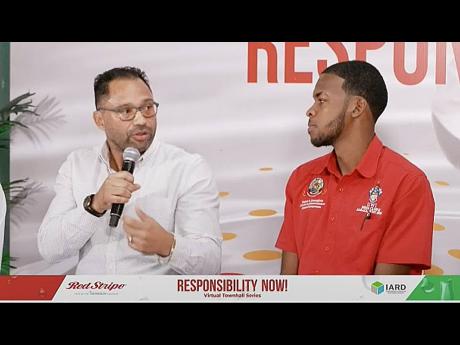Responsible alcohol consumption touted at Red Stripe town hall
WITH THE Yuletide season fast approaching, Red Stripe’s latest staging of its ‘Responsibility Now!’ town hall series, under the theme ‘Beyond the Tagline: Unpacking Responsible Consumption’ highlighted the importance of drinking in moderation and the need for exercising responsible consumption of alcohol.
Andrew Folkes, author of The Power of Pain: My Pain My Breakthrough, who was a part of a five-person panel, spoke to his personal journey of abusing alcohol, noting that coupled with his life challenges, he suffered with finding purpose and would drink over his alcohol intake limit.
Folkes continued – during the event at Red Stripe’s 214 Spanish Town road location – that one day, he managed to consume 14 Guinness stout beverages in the span of two hours and held a knife in his hand with the intention of ending his life. The Private Sector Organisation of Jamaica (PSOJ) partnered with the beverage company in hosting the meeting.
Overwhelmed with the burdens of life at the time, Folkes did not get his wake-up call until Father’s Day last year when his eight-year-old daughter gave him a gift bag which had various items, but more surprisingly, included five bottles of Guinness.
His daughter, he said, had decided on the items that she wanted to gift him, and her mother purchased them on her behalf. Folkes recalled being at an initial loss for words, adding that his actions were being observed by his daughter and that he was not aware that she had been so attentive to them.
“I had to sit down and say, ‘If I’m doing something like this to the point where my eight-year-old child actually would not present a gift bag to me without Guinness, I really had to fix my issues’,” he said.
Folkes described his background as being a ‘street kid’ who associated with troubled youngsters in his inner-city community. He noted that this environment did not promote the idea that men should also express their feelings and emotions when faced with difficulties relating to psychological, social, financial, or such issues.
As a result, Folkes stated that the young men would often suppress their emotions and drink their troubles away.
NO JUDGEMENT
He urged the audience not to judge persons who they saw drinking in bars as those persons may be going through issues that they would never be able to understand.
“Most persons, their idea of drinking responsibly is moderation, but a part of responsible drinking is actually addressing the reason why you drink because oftentimes, the reasons we drink is [linked to] the amount [of alcohol] we consume,” Folkes said.
“Drinking because of a promotion [or other celebratory occasions] is different from drinking because of a divorce ... [because] is me at home with a few bottles by myself, no guidance, no friends,” he continued.
As a result, he said that it was important for individuals to conclude that their reasons for drinking needed to be reconsidered.
He called on persons to help affected individuals overcome the challenges which led them to a life of alcohol addiction as “there’s always a root cause” as to why persons enter a local pub for a drink, especially in the wee hours of the morning.
“Promoting responsible drinking is one, [but] it’s harder to ... understand that the person that is affected by alcohol abuse is not the person who watch [these kinds of] programmes. They aren’t the persons who are here, and so what we need to do ... [is to] go into the communities,” Folkes said.
Moderator of the panel discussion Dr Terri Karelle Reid, who identified herself as being a non-drinker, shared that whenever she was in social spaces and persons asked what she would like to drink, she was often met with questions about why she had decided not to have anything.
“I realise that when I tell them that I’m just not a drinker, I would feel a little bit judged for being in a social space and not partaking the way everyone does ... so I always have to justify why I’m not drinking,” she said.
BUILDING HEALTHY HABITS
Raynor Honeyghan, cultural and entertainment affairs chairperson of The University of the West Indies, Mona, spoke to drinking responsibly while on campus and during campus-led entertainment events.
He pointed to the UWI Mona Guild of Students’ ‘Level Di Liquor campaign: Know you limit. Drink responsibly’ campaign, which is aimed at sensitising and educating the student population on the various effects of drinking alcohol irresponsibly.
Honeyghan continued, saying that the student leaders also sought to encourage students to build healthy habits and to know that consuming alcohol did not have to be the solution to every life inconvenience and challenge but that they could engage themselves otherwise, such as through sports, to release stress.
“Students normally feel overwhelmed during this time due to exams and you’ll find that the campus is very quiet but after all those exams and you study so hard, you feel so overwhelmed, so you turn to drinking ... and they feel a release sometimes,” he said.
He said that others use drinking alcohol to cope during the exam pressures and that such behaviours were worrying.
With this, the student leaders also encouraged the use of UWI’s one love counselling programme for individuals to seek help.
For his part, Dr Shane Alexis, general practitioner and past president of the Medical Association of Jamaica (MAJ), stated that it is not helpful for individuals to tell an alcoholic not to drink as this does not result in a change of their behaviour.
“It’s really for us to start from where we are culturally and work forward together,” he said.
Alexis called for a multisectoral and a multigenerational approach to be adopted in an effort to change the culture of the society surrounding alcohol.
“Responsibility comes from [the word] response, which means we’re all answerable. The Government is answerable, the producer is answerable, the consumer is answerable, and I think this kind of activity really comes a far way,” he said.
Tips for responsible drinking
· Eat food before consuming alcoholic beverages.
· Keep hydrated.
· Don’t leave a drink unattended. Either finish it, take it with you, or throw it away
· Be aware of sudden changes in the way your body feels.
· Have a designated driver if you plan on overindulging.
· Avoid drunk driving.
· Know your alcohol intake limit.


